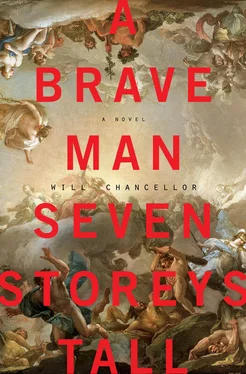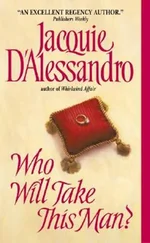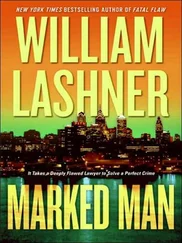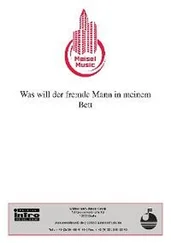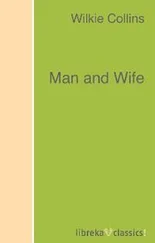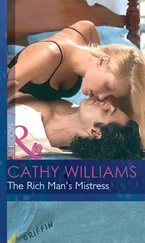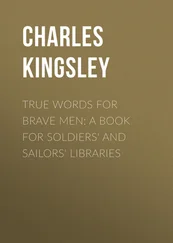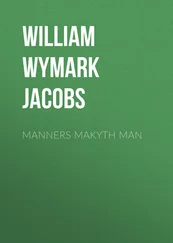— Specifically needs to wait until we’ve signed the contracts. So what do you say?
Owen raised a glass as a why-not. Kurt clanked it as a handshake. Hal returned just in time to offer a toast:
— To the Cripple and the Cyclops — at least you’ll get their attention.
They drank. Kurt spoke sotto voce so his words would be noticed by a nearby table of girls.
— Don’t underestimate being noticed. A little bit of pressure and the sense of an audience are essential to molding an artist. You know, if a few museums in London, or New York, or whatever, exhibit your work.
Kurt lit a cigarette, continued.
— Or if you’re collected by some really big names. I know right now you just want to sell work, sell something to anyone, but you’re better off starving. It’s not how much you sell, it’s who you sell to. Guard your work. Set the prices high, then prove them. The goal is to get to a point where you can’t make enough work to keep the most serious collectors in the world happy. Whatever. I mean. The only thing that matters is that your friends are taken care of. You know, people come in to see my art or whatever and then maybe see a picture of Hal’s and think, “Shit, if Kurt thinks he’s good, I should buy this guy while he’s cheap.” When you’re around successful people you get noticed, and maybe you pick up some of the habits that made them successful in the first place. Whatever it is you’re trying to do in Berlin, I can guarantee that from my platform more people will hear the message.
Owen, young and allergic to any sales pitch, answered:
— I’m more concerned with the quality of the message than the volume.
— You don’t need to pretend to be noble. This is Berlin. We’re all monsters here.
Kurt now got Hal’s attention and pantomimed lighting a pipe. They stopped at the table of girls. Kurt said something that made the prettiest one blush.
Owen returned to his book. Previous Kurt sightings had done much in the past month to undercut his romantic notions of being an artist, but he also wasn’t prepared to back out — if for no other reason than to figure out if art was the wasted half or his real reason for staying above the ground.
Kurt and Hal came back with red eyes, surrounded by a cloak of tobacco. Kurt locked his wheels. Hal stooped over the table and began sketching a map of Prenzlauer Berg and Friedrichshain on a napkin with his felt-tipped pen.
— If you follow Saarbrücker Straße, Kurt said, through Prenz’l Allee, it will change names, but stay on the road. Eventually it hits our park.
Kurt took the napkin and added several trees, a triangle, and a cylinder. He squinted, pinched his cigarette, and admired his work.
— This is the Wasserturm , he said, adding a star to the top of the cylinder. Do you know that word? It means “water tower.” You’ll see it when you get in the park. It’s on the top of a hill. You can stay with us as long as you like — a month at least.
— I can’t really pay you anything.
Kurt cocked an eyebrow.
— I’d never expect you could.
Hal tried to find an earnest expression:
— You’re lucky you came here tonight.
— You live in a water tower?
— The big Wasserturm is in Kollwitzplatz. Our Wasserturm was built for a brewery.
Kurt explained:
— These kinds of things would never be possible now, even with colossal sums of money. Hal and I were in East Berlin at the beginning, and now we have my gallery to take care of all the paperwork — because of the wheelchair or whatever. We’ve been living in the water tower since the mid-nineties. When this shit happened, we converted the stairs to a big ramp, like the Guggenheim.
Hal finished his wine then clapped Owen on the shoulder.
— You’ll see for yourself. Go check out from your hostel or whatever and meet us at the tower tonight. The door will be open. First floor’s yours.
Kurt stabbed out his cigarette.
— European first floor. American second floor. You’ll see.
Kurt shook Owen’s hand and turned away when the young woman he had been performing for walked over. Owen bussed wineglasses. Hal followed him to the sink.
— Come tonight. It will seem too awkward tomorrow. But trust me, this is a good idea. I know better than anyone that Kurt can be… abrasive. But if there’s one person in Berlin who can make your career, it’s Kurt. You’ll be famous by Christmas. You won’t even need to try. Your only question should be: Do I want to do anything with my life while I’m still young enough to have a good time doing it, or do I want to read Greek in a wine bar?
When he’d finished drying the last glass, Owen shook his head and snorted.
— All right, let’s have some fun.
Hal returned to Kurt and the young woman already seated in Kurt’s lap. Kurt yelled over the music:
— You may not see us tonight. We won’t be back early. But make yourself at home. You’re a monster now.
Unaccustomed to the silence of the gods, Owen was left to follow whatever he had. In this case, a crudely drawn map. A day’s drizzle gathered to a drop and fell from the awning onto the napkin in Owen’s hand. Blue lanes drawn in felt pen began to swell and bleed into one another. Tethered clouds, which Kurt had drawn to indicate a forest, lay just ahead to the north. And beyond, in a park past the cross-field cemetery, was the cylinder with a star on top, the Wasserturm .
Owen folded the napkin-map along its frilled edges and placed it in his coat as a pocket square. As he checked out of the hostel, he asked if he could continue to use the beach cruiser, since it was the only bike big enough for his knees. That got a laugh from the manager.
And fair enough. It was better that he was walking into this new world, their world. He thought of Brancusi — or was it a character in Balzac? — walking hundreds of miles to Paris to begin his new life. Owen kicked past the gated cemetery and saw the entrance to the park.
The Volkspark Friedrichschain peeled around him. Maple and oak carpeted the empty winter fountain with layers of leaves in the lamplight, all waiting patiently for a psoph to flip them over and dry their undersides, a keel like Owen’s that would wake the twigs and tangles. Fallen limbs. Thick mist swelling above the plaster fauns and fairy forms. Vapors condensing on goat-riding cherubim. A peeling park waiting for this night. And past the colonnade, past the keystone arches and knobby balustrade, the trees framed a vanishing point of the Wasserturm .
Now Hal’s magnanimity made sense. How could anyone draw a map for a stranger to a monolith in the middle of a deserted, wild park without at least a chuckle? Owen circled the sandstone tower until he found the door.
Heavy enamel layers told the story of a war against graffiti. A deep red shellac was now overrun with silver Krylon and names like SKELO and ÜTER and TRAK written in white paint pen. The double-door junction was covered in what appeared to be the dried spittle of a fire extinguisher, but proved to be more paint. Several band stickers had been slapped on the flat panels of the door. Next to the doorknob, a stencil of Dr. Strangelove.
Hal and Kurt had both promised the door would be unlocked. It wasn’t. Owen knew this was some elaborate prank and looked for a cameraman crouching in the bushes, waiting to spring out and yell “Gotcha.” He listened, but heard nothing. He looked up each of the trees equally spaced around the tower, giving the impression that the tower had been planted at the center of everything.
He turned the knob counterclockwise with more conviction. It clicked, but wouldn’t open. The wood had swollen into the frame. He slammed his shoulder into the weathered door.
Читать дальше
